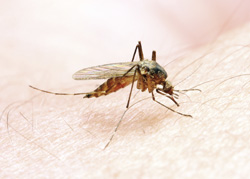A combined effort for antimalarial drugs
Malaria is a mosquito-borne infectious disease that infects humans through the parasite Plasmodium falciparum. Many drugs are available that target the disease, but monotherapeutic approaches often lead to the development of resistance, necessitating alternative treatments. The EU-funded ′Development of new drugs for the treatment of malaria′ (Antimal) project placed special emphasis on progressing candidate molecules to the stage of drug development. To achieve this goal, 28 leading groups of malaria researchers from Europe joined forces with industrial partners and institutions from malaria-endemic countries. In order to secure the development of a portfolio of viable antimalarial drugs, the network explored novel compounds based on quinolines and peroxides, as well as drugs targeting parasite lipid metabolism or other targets. The objectives were to provide clinical evaluation of a series of novel drugs which could in turn offer effective and affordable treatment of malaria within endemic countries. Additionally, through training of the next generation of malaria researchers, the consortium hoped to advance research capacities in malaria-endemic countries in sub-Saharan Africa. To this end, the consortium used quinolines as proof-of-concept molecules against the blood and the liver stage parasites to establish in silico and in vitro antimalarial drug metabolism and pharmacokinetics (DMPK) expertise in South Africa and Zimbabwe. Hundreds of peroxide monotherapies and hybrids were also developed that exhibited improved activity against drug sensitive and resistant parasites compared to existing molecules. Furthermore, thousands of other compounds interfering with parasite biology were tested on P. falciparum with the isoprenoid biosynthesis targeting molecule FR900098 receiving special attention. Collectively, the Antimal project deliverables constitute a major contribution towards malaria treatment, offering many alternative drugs for combinatorial therapy. By extending the work in malaria-endemic regions, the network succeeded in equipping these countries with the necessary infrastructure for developing and evaluating antimalarial drugs.







